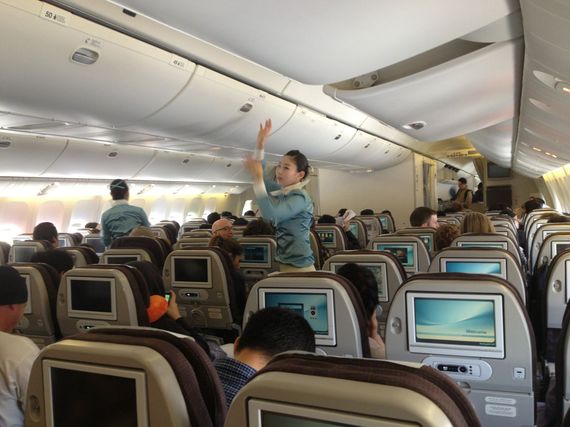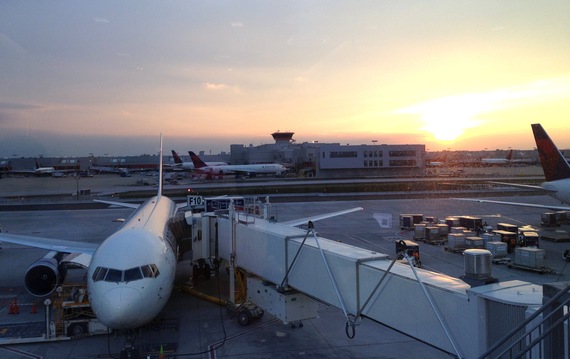
I took my first 20-plus hour-long flight when I was 16-years-old. Since then, I have been on countless transcontinental journeys, traveling to almost 50 countries across six continents. The longest flight I took was 26 hours from Atlanta to Singapore. Having family in India, I fly the 20-plus hours of the Atlanta to New Delhi route generally once a year. Oftentimes, readers ask me how do I endure those long flights -- how do I kill time, and do I ever get jet lagged?
Flying is stressful, inconvenient and tiring. It takes a toll on you mentally and physically. Though you want to arrive at your destination in a cheerful mood and have energy for sightseeing, long flights make you grumpy and sleepy. Traveling first-class may help avoid some of these symptoms, but most of us cannot afford it. So, how do you keep the wanderlust alive and make trans-Atlantic journeys every few months while not feeling like you just came out of anesthesia?
Here are some of my tried and tested tips that will prepare you for long flights and jet lags.
What to pack for the plane?
To prepare for an upcoming long journey, I make sure I have a few basic essentials in my handbag or backpack. A travel pillow, eye mask, lip moisturizer, hand lotion, mouthwash and earplugs are essentials. I also carry an aluminum water bottle so that I don't have to call for the hostess every time I'm thirsty. For snacks, I keep dried fruits, nuts and granola bars with me at all times. If you can sneak in a fresh fruit or two, make sure to eat it during the first few hours of the trip; otherwise, it will rot, and you will end up throwing it out.
Nowadays, most coach class seats are equipped with personal entertainment systems. Nevertheless, there are flight delays, connections and times when systems are shut off. Rather than being completely reliant on the airline to occupy me, I carry a good book, an iPad with pre-downloaded magazines and books, a fully charged laptop, iPhone (with my personal travel playlist) with a double battery (called Mophie), and noise cancellation ear buds. Also, before departure, I make a list of work-related tasks I can do during the flight, such as reading articles, replying to pending emails, writing journals or blogs, or editing pictures, so that I can use my travel time productively.
Eat, drink or sleep?
Many travelers tell me that they drink lots of wine or pop in a pill so they can fall asleep for the majority of a flight. My two cents: You are setting yourself up for jet lag! Thin air in high altitudes makes your body dehydrate very quickly. If you drink alcohol, you will get a headache, probably a hangover, and not have a relaxed sleep. Taking a sleeping pill will also make you very groggy after the flight, especially if there is a change of plane involved. Most sleep aids recommend you do not take them unless you can get a comfortable eight hours of sleep. The economy seat is not an ideal place to get a good night's rest, and you will get disturbed frequently by babies crying, neighbors talking, or your co-passenger getting up to use the loo. So try to sleep naturally as much as you can.
Drink lots of water during your flight. If you must, have only a glass of wine, but try to refrain from alcohol. Keep a bottle of water with you so you can sip on it frequently and stay hydrated. The amount of water that airline stewards serve you in the little plastic cups is nowhere close to a recommended diet, even on a normal day.
I also add powdered Vitamin C to my water to strengthen my immunity. Being in close proximity with 180 other passengers for long periods of time is a good breeding ground for infections.
I highly recommend eating a good healthy meal before getting on the plane, and skipping every other, if not all, meals served in air. During an 10-hour flight to Europe, the stewards will serve you two meals that will generally be heavy on starches. A standard airline meal consists of a choice of pasta with cheese or rice with chicken, flavored with lots of salt, accompanied by bread, brownie and a tiny salad. If you are flying for 20 hours, you have barely moved around and would have eaten four high-calorie meals. Many passengers eat on the plane purely out of boredom -- that is why I recommend carrying healthy snacks to munch on. If you eat less during your journey, you will not feel the tight knots in your stomach once you arrive at your destination. The high carb diet they serve on most airlines is not ideal for an inactive body, so I try not to eat most of what is served on the food carts. You have to keep in mind that an airline's job is to transport you from point A to point B, not to create a gastronomic experience or watch your diet.
Is my time flying by?
Most airplanes are now equipped with personal television monitors and access to many music, movie, gaming and television channels. I encourage you to watch a movie or two during your flight; however, don't feel obligated to catch up on all the blockbusters you have missed out on. Just as at home, watching television can be quite addictive. Compartmentalize your time for watching movies, resting and other activities.
I like to keep myself entertained by juggling watching movies, reading books and magazines, and listening to music. Even if you spend an hour on each of these activities, and sleep for a few others, you will see that the time will fly by.
If you are awake, I recommend you get up once every hour and take a stroll down the aisle of the aircraft to get your blood flowing. Go to the alley in the back and stand by for a few minutes, stretch your neck, arms, and legs. This will help ease the tiredness and body aches that you get as a result of sitting in coach.
Almost there!
Once you get off your plane and check in to your hotel, your first instinct would be to crash on the bed you suddenly have a deep appreciation for and doze off until the next sunrise. After you take care of basic hygiene (brushing your teeth, taking a shower, and changing clothes), lie down for a nap. Make sure you change your clock and set an alarm. Give yourself no more than three hours to nap. If you arrived at 5 p.m. or later, avoid taking a nap altogether. You must adjust to the new time zone right away to avoid jet lag.
Next, go out and breathe fresh air. It is amazing what sun and breeze can do for you. Even if you are tired and don't feel adventurous enough to leave your room, take a walk around your hotel, visit a nearby park, and soak in the scenes of the new place.
Research shows it takes one day for your body to adjust for every hour of time change. That means you will feel comfortable with a 12-hour time change after about 12 days. For most people, the vacation may be over by then. The best way to get over jet lag is to not think about your "old time zone." You are here now, in Hong Kong or New Delhi, and this is your new day. Remind yourself to eat your meals on time, sleep only at night, and follow your regular routine as soon as you hit the ground. If you follow my advice, you will never feel jet lagged again in your life.

